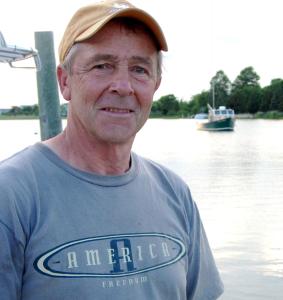Howard Pickerell

Peconic Estuary Interviews
In 1997 the Peconic Estuary Council hired Nancy Solomon to interview East End fishermen and baymen as part of its work in developing a master plan for the estuary. Solomon interviewed ten fishermen and continued to document the east end fishermen in later years.
National Capital Contracting
Howard Pickerell is a boat builder with a specialization in constructing traditional Garvey and Sharpie boats. His career is marked by a deep understanding of the unique features and construction procedures of these boats, which have evolved over the years. Pickerell's work is not only a reflection of his craftsmanship but also a testament to his connection with the maritime heritage. His clientele has varied as the demand for commercial fishing boats has declined, indicating a shift in the boat-building industry. Pickerell's life is also intertwined with his experiences as a bayman, a profession he inherited from his father. He has witnessed the decline of clamming in Huntington Bay and has adapted to the changing landscape by relocating to Noyack. His narrative includes the transformation of clam harvesting practices, the ecological challenges faced by shellfish due to high salinity, and the dwindling number of full-time baymen. Pickerell's transition to oyster farming and his innovative modifications to boat designs for scalloping further highlight his adaptability and resourcefulness in the face of an evolving industry.
Scope and Content Note
The interview with Howard Pickerell provides a comprehensive overview of his life as a boat builder and bayman. Pickerell shares insights into the construction and features of Garvey and Sharpie boats, detailing the materials used and the evolution of building techniques. He reflects on his customer base and the broader decline in commercial fishing, offering a perspective on the current state of boat building. Pickerell recounts his personal history of clamming with his father, the reduction of clamming activities in Huntington Bay, and his subsequent move to Noyack. He addresses the environmental and economic factors affecting clam populations, such as high salinity and the shift from full-time to part-time recreational clamming. The interview also covers Pickerell's experiences with boat modifications for scalloping and his venture into oyster farming. He discusses the challenges faced by local baymen in the aquaculture industry, the importance of water quality for shellfish, and the process of oystering. Pickerell comments on the decline of traditional boat building and contemplates the future of the industry, emphasizing the necessity of hard work and dedication. Additionally, he shares his personal practice of maintaining 60 oyster cages and the use of an electric winch for their retrieval, noting the incidental catch of scallops and clams, which he chooses not to sell.
Please Note: The oral histories in this collection are protected by copyright and have been created for educational, research and personal use as described by the Fair Use Doctrine in the U.S. Copyright law. Please reach out Voices@noaa.gov to let us know how these interviews are being used in your research, project, exhibit, etc. The Voices staff can help provide other useful resources related to your inquiry.
The NOAA mission is to understand and predict changes in climate, weather, oceans, and coasts, to share that knowledge and information with others, and to conserve and manage coastal and marine ecosystems and resources. The Voices Oral History Archives offers public access to a wide range of accounts, including historical materials that are products of their particular times, and may contain offensive language or negative stereotypes.
Voices Oral History Archives does not verify the accuracy of materials submitted to us. The opinions expressed in the interviews are those of the interviewee only. The interviews here have been made available to the public only after the interviewer has confirmed that they have obtained consent.
